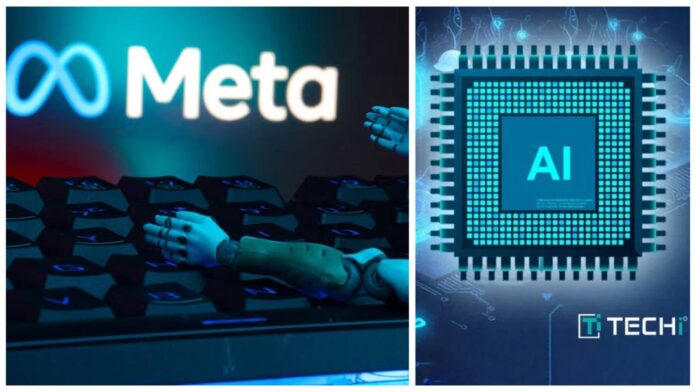Meta has taken a page out of Nvidia’s book – the social media giant is now testing its first-ever internally developed chip for training artificial intelligence (AI). As per reports, the company, which owns Facebook, Instagram, Threads, and WhatsApp, has already deployed a small number of its new chips for testing. If the initial trials meet expectations, Meta is likely to ramp up production for broader deployment, marking a significant shift in its AI hardware strategy.
According to a report by Reuters, Meta’s new AI training chip is an accelerator designed specifically for AI-related computations. Unlike traditional GPUs, which handle a wide range of computing tasks, dedicated accelerators are optimized solely for AI workloads, making them potentially more power-efficient and cost-effective. The chip has been manufactured in partnership with Taiwan Semiconductor Manufacturing Company (TSMC), one of the world’s leading semiconductor foundries. This collaboration underscores Meta’s commitment to gaining greater control over its AI infrastructure while reducing its reliance on third-party suppliers like Nvidia.
Meta’s testing phase began following the successful completion of a “tape-out,” a crucial milestone in chip development where the initial design is finalized and sent to a fabrication facility for production. This stage typically costs tens of millions of dollars and can take between three to six months to complete, with no guarantee of success. If the chip fails to meet performance expectations, Meta would need to troubleshoot the design and repeat the process, further delaying its AI ambitions.
The new AI training chip is part of Meta’s broader Meta Training and Inference Accelerator (MTIA) program, which has had a mixed track record. Previous efforts to develop custom AI chips have faced setbacks, with at least one prior project being scrapped after failing to meet performance targets. However, Meta successfully deployed an MTIA chip last year for inference tasks—running AI models in real-time as users interact with them—demonstrating some progress in its chip development efforts. The latest chip represents an evolution of this strategy, signaling Meta’s renewed confidence in its ability to compete in the AI hardware space.
Meta’s AI strategy is initially focused on using its in-house training chips to improve the recommendation algorithms that power content selection on Facebook and Instagram. These recommendation systems are a core component of Meta’s business model, influencing everything from social media engagement to digital advertising. By optimizing AI training processes, Meta aims to enhance user experience, drive engagement, and maximize ad revenue. In the long term, the company plans to expand the use of its proprietary chips beyond recommendation systems to power its generative AI products. One such application is Meta AI, the company’s chatbot designed to compete with offerings from OpenAI and Google.
This development comes at a time when Nvidia remains the dominant force in AI chip manufacturing. Meta’s move to develop its own AI chips aligns with a broader industry trend of tech giants seeking greater self-sufficiency in AI hardware. Companies like Google, Amazon, and Microsoft have already developed custom AI chips tailored to their specific needs. By following suit, Meta hopes to reduce its dependence on external suppliers and gain a competitive edge in AI development.
However, this shift does not come without challenges. Meta faces significant hurdles in scaling up its AI chip production, particularly given its mixed history with in-house hardware development. In an earlier attempt to produce a custom AI inference chip, Meta abandoned the project after a small-scale deployment failed to deliver the desired performance. Following that failure, the company reversed course and placed substantial orders for Nvidia GPUs in 2022 to meet its AI infrastructure needs. Since then, Meta has remained one of Nvidia’s largest customers, purchasing GPUs to train its AI models.
Despite these past setbacks, Meta is making a calculated bet that developing its own AI chips will eventually yield long-term benefits. The company’s total projected expenses for 2025 are expected to range between $114 billion and $119 billion, with up to $65 billion allocated to capital expenditures. A significant portion of this budget is likely earmarked for AI infrastructure, including the potential mass production of its new training chips. If successful, these chips could help Meta reduce operational costs and increase efficiency in AI training, ultimately strengthening its position in the AI-driven digital ecosystem.
Meta’s ongoing chip development efforts also come amid a broader surge in AI investment across the tech industry. As AI continues to transform social media, search engines, and cloud computing, companies are racing to optimize their hardware to stay ahead of the competition. Whether Meta’s in-house AI chip proves to be a game-changer remains to be seen, but the company’s push into AI hardware signals a clear intent to solidify its position as a leader in the next era of computing.


